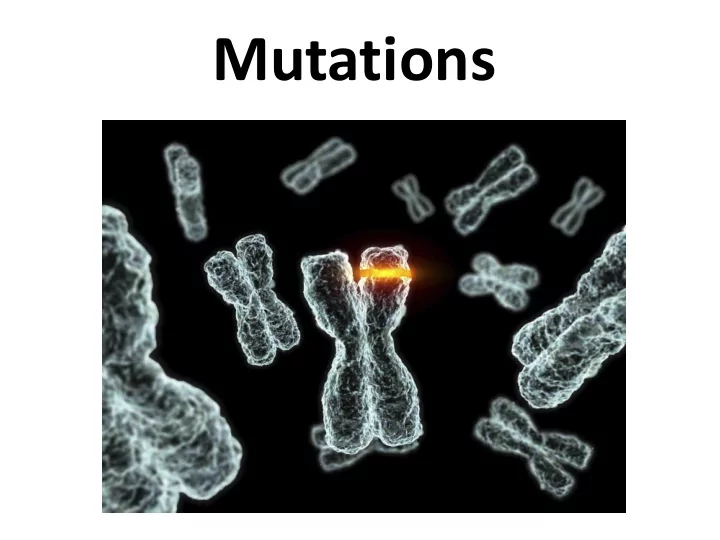

Mutations
What is a mutation? • ANY change in the genetic material (DNA) • Mutations may be spontaneous or caused by mutagens (physical and chemical agents) • Mutations are the primary source of genetic variation (not all are harmful) • Mutations may provide an organism with a selective advantage (evolution)
Types of Mutations A. Chromosomal Mutations - large-scale mutations - affect many genes on a chromosome B. Gene Mutations - small-scale mutations - affect only one gene and therefore one protein
Types of Mutations Chromosomal Gene Mutations Mutations • Point Mutations • Silent • Inversion • Missense • Duplication • Nonsense • Deletion • Translocation • Frameshift Mutations • Nondisjunction • Insertion • Deletion
Chromosomal Mutations
Chromosomal Mutations • Mutations result from errors in mitosis or meiosis • Changes in chromosome number often result in new phenotypes, including sterility caused by triploidy and increased vigor of other polyploids • Changes in chromosomes number often result in human disorders with developmental limitations
Polyploid Plants • Multiple copies of each chromosome instead of only 2 copies of each chromosome (2n)
Human Disorders • Trisomy 21 (Down Syndrome) – three copies of chromosome 21 instead of two • Turner Syndrome (XO) – female with one X chromosome instead of two • Both disorders result from nondisjunction of chromosomes during Meiosis
Chromosomal Mutation: Nondisjunction
Other Chromosomal Mutations
Gene Mutations
Gene Mutations
Nucleotide-Pair Substitutions • Replacement of one nucleotide and its partner with another pair of nucleotides • Results in a silent, missense or nonsense mutation
Silent Mutation • Mutation has no effect on the encoded protein due to the redundancy of the genetic code
Missense Mutation • Changes one amino acid to another • May have little effect on the protein or drastically change the proteins function
Sickle Cell Anemia • Example of a missense mutation • Mutation affects a crucial area of the hemoglobin protein
Nonsense Mutation • Changes an amino acid into a stop codon • Translation terminated prematurely
Nucleotide-Pair Insertions and Deletions • Additions or losses of nucleotide pairs in a gene • Result in frameshift mutations
Frameshift Mutations • Usually affect the resulting protein more dramatically than other gene mutations
Effects of Mutations • DNA mutations can be positive, negative or neutral based on the effect or lack of effect they have on the resulting nucleic acid or protein • Example: Heterozygote Advantage – Tropical Africa where Malaria is common
Heterozygote Advantage
Effects of Mutations • Changes in genotype may affect phenotypes that are subject to natural selection • Genetic changes that enhance survival and reproduction can be selected by environmental conditions • Example: Antibiotic resistance and pesticide resistance mutations
Antibiotic Resistance
Pesticide Resistance
Recommend
More recommend